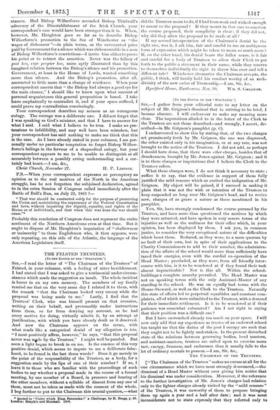THE FELSTED TRUSTEES.
[TO THE EDITOR OF THE " SPECTATOR.") ;SIR,—I read the letter of "The Chairman of the Trustees" of Felsted, in your columns, with a feeling of utter bewilderment. I had stated that I was asked to give a testimonial under circum- -stances which made the suggestion an insult. The whole incident is burnt in on my own memory. The members of my family remind me that on the very same day I related it to them, with the remark "that the Chairman looked very uneasy while the proposal was being made to me." Lastly, I find that the 'Trustees' Clerk, who was himself present on that occasion, writing on their behalf, and presumably under instructions from them, so far from denying my account, as he had every motive for doing, virtually admits it, by an attempt at justification, with which you have already dealt as it deserved. .And now the Chairman appears on the scene, with what reads like a categorical denial of my allegation in lobo. "I most positively affirm, however," he says, "that this proposal never was m&cle by the Trustees." I might well be puzzled. But soon a light began to break in on me. Is the essence of this very positive denial, which seems to impute to me a deliberate false- hood, to be found in the last three words? Does it go merely to the point of the responsibility of the Trustees, as a body, for a suggestion made by the lips of one of their number ? If so, I leave it to those who are familiar with the proceedings of such bodies to say whether a proposal made in the course of a formal meeting, by one member of a Board, in presence and hearing of the other members, without a syllable of dissent from any one of them, must not be taken as made with the consent of the whole. I beg further to put to the Chairman this crucial question,—what • Quoted in "Under which Sing, Benzonlan ?" a Challenge, by H. Bragg, p. 29. London: Simplcin and Marshall. 1869.
did the Trustees mean to do, if I had been weak and wicked enough to assent to the proposal ? If they meant in that case to sanction the course proposed, their complicity is clear; if they did not, why did they allow the proposal to be made at all?
If my second interpretation of the Chairman's denial be the right one, was it, I ask him, fair and candid to use an ambiguous form of expression which might be taken to mean so much more? lf, on the other hand, his denial bears the fuller sense, is it fair and candid for a body of Trustees to allow their Clerk to put forth to the public a statement in their name, while they reserve to themselves individually the right to throw him over and tell a different tale? Whichever alternative the Chairman accepts, the public, I think, will hardly hold his conduct worthy of an arch- divinity of the new cult us of Trasteeship.—I am, Sir, &c., Hyndford House, Eastbourne, Nov. 30. We. S. Giutoliow.






































 Previous page
Previous page